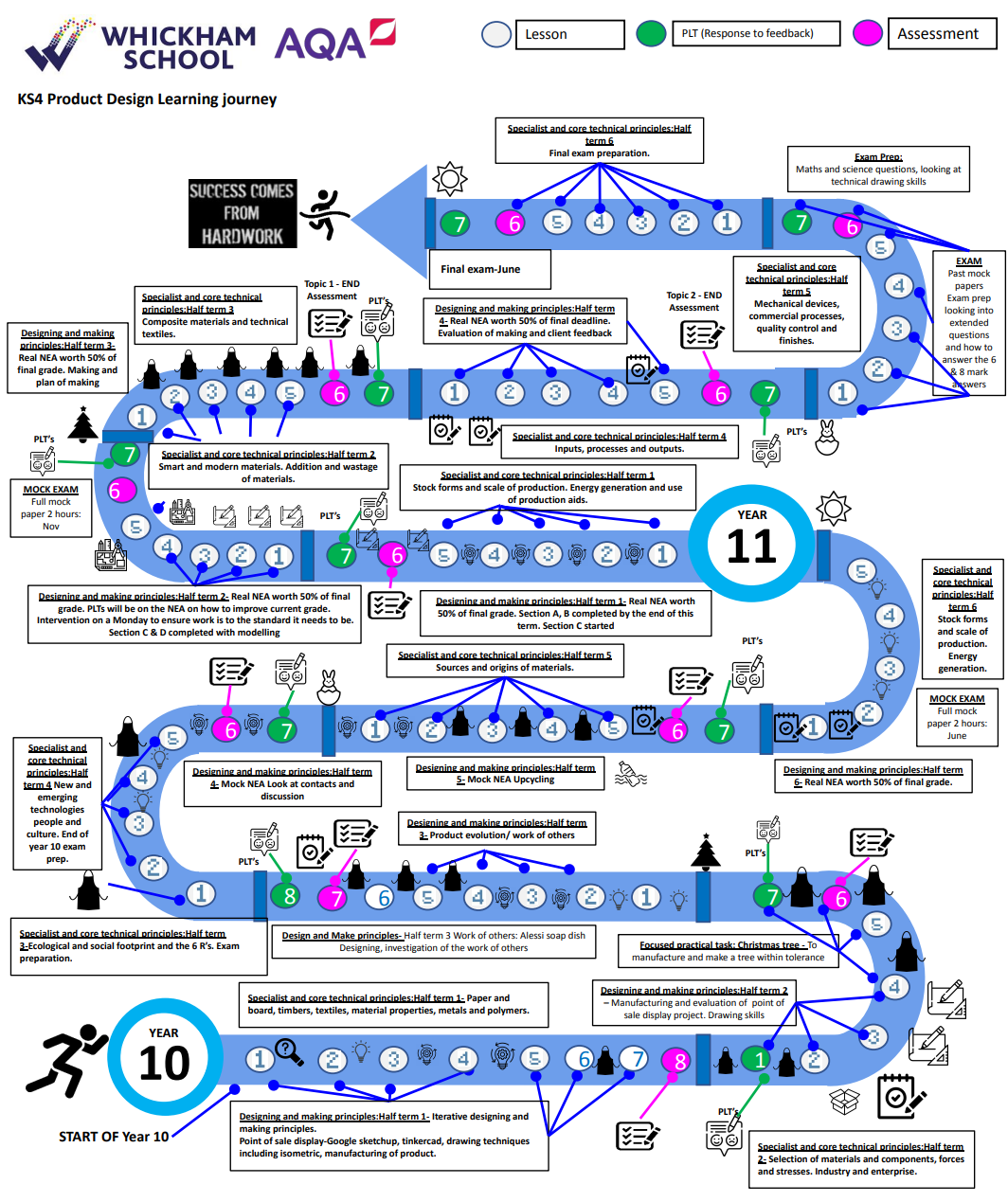Design Technology Curriculum
Our aim is to develop the creative, technical and practical expertise needed to perform everyday tasks confidently and to participate successfully in an increasingly technological world. We aim to build and apply a repertoire of knowledge, understanding and skills in order to design and make high-quality prototypes and products for a wide range of users. Our pupils will critique, evaluate and test their ideas and products and the work of others. Pupils will also understand and be able to apply the principles of nutrition and learn how to cook independently.
By the time they leave Whickham School, pupils will have gained key knowledge and skills in the five main areas of the design and technology curriculum: design, make, evaluate, technical knowledge, cooking and nutrition. Along with three main areas developed within engineering: key engineering sectors, engineering practical and technical skills, key skills for employment in engineering. The objectives within each strand support the development of learning across the key stages, ensuring a solid grounding for future learning and beyond.
What do we want to achieve?
- a practical curriculum that seeks every opportunity to apply theoretical knowledge to real world contexts.
- a relevant and diverse curriculum that will expose pupils to current thinking and practice.
- a challenging and engaging curriculum that encourages pupils to solve problems independently
- a curriculum which fosters a love of learning and a clear development of skills, allowing our team to share and model their passion for their subject
- a curriculum which allows all pupils, no matter what ability or classroom they find themselves in, to make the best possible progress
What skills and knowledge will pupils develop?
- Design & Technology Subjects are broken up into the 4 assessment outcomes:
- Design
- pupils will use research and exploration, such as the study of different cultures, to identify and understand user needs
- pupils will identify and solve their own design problems and understand how to reformulate problems given to them
- pupils will develop specifications to inform the design of innovative, functional, appealing products that respond to needs in a variety of situations
- pupils will use a variety of approaches to generate creative ideas and avoid stereotypical responses
- pupils will develop and communicate design ideas using annotated sketches, detailed plans, 3-D and mathematical modelling, oral and digital presentations and computer-based tools
- Make
- pupils will select from and use specialist tools, techniques, processes, equipment and machinery precisely, including computer-aided manufacture
- pupils will select from and use a wider, more complex range of materials, components and ingredients, taking into account their properties
- Evaluate
- pupils will analyse the work of past and present professionals and others to develop and broaden their understanding
- pupils will investigate new and emerging technologies
- pupils will test, evaluate and refine their ideas and products against a specification, taking into account the views of intended users and other interested groups
- pupils will understand developments in design and technology, its impact on individuals, society and the environment, and the responsibilities of designers, engineers and technologists
- Technical knowledge
- pupils will understand and use the properties of materials and the performance of structural elements to achieve functioning solutions
- pupils will understand how more advanced mechanical systems used in their products enable changes in movement and force
- pupils will understand how more advanced electrical and electronic systems can be powered and used in their products
- pupils will apply computing and use electronics to embed intelligence in products that respond to inputs and control outputs, using programmable components.
- Design
- Engineering Subjects:
- pupils will develop key engineering practical and technical skills, such as research, observation, measurement, making, using computer-aided design (CAD) and disassembly
- pupils will develop their knowledge of key engineering sectors (mechanical, electrical/electronic and engineering design) and the interrelation of each in industry
- pupils will develop their knowledge of the stages involved in planning and implementing an engineering project
- pupils will develop their knowledge and skills involved in the investigation of solutions to engineering problems in response to a given brief.
- Food and nutrition Subjects:
- pupils will understand and apply the principles of nutrition and health
- pupils will cook a repertoire of predominantly savoury dishes so that they are able to feed themselves and others a healthy and varied diet
- pupils will become competent in a range of cooking techniques
- pupils understand the source, seasonality and characteristics of a broad range of ingredients.
Access for all pupils
- All learners must be encouraged to improve both their confidence and competence in their design technology literacy during all aspects of their learning, this is inclusive of cross curricular links, and also any elements of their education whereby design technology might be better exploited to improve their learning
- Feedback used to direct differentiation and progress through the topics
- Tracking sheets used to identify individual and whole class misconceptions to trigger targeted intervention
- Scaffolding present through curriculum resources which seek to support less able pupils in segmenting their learning and allow more able pupils to challenge their understanding
- Use of WAGOLLs, helping hands and challenge tasks available for every topic
- Revision checklists produced to aid pupils in the production of comprehensive revision resources to consolidate learning
- Recall and interleaving activities built in to all lessons to ensure prior learning is retained and developed on.


